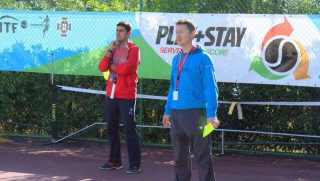

By Mark Tennant, Director of inspire2coach
What’s the best way to learn as a coach? Is there a perfect way to learn new ideas, develop new philosophies and strategies? Since i2c started in 2007, we have qualified more than 7000 coaches in the UK; that’s 7000 coaches who have attended one of our Level 1, 2, 3 or 4 course to gain a qualification. That’s huge! But in terms of having a personalised and individualised approach built around you, your programme and your business, mentoring is usually a far more effective way to learn. So, do you know how to judge if mentoring is for you?
Whether you are a young coach or a new coach starting out, or an experienced coach looking for specific help or input, I think it’s just so important that you’ve got experience and respected people who are willing to help you, who are willing to support you, willing to advise you.” From an interview I recorded with Coach Seek, The role of chance conversations, goal setting and finding the perfect mentor
In this three-part series on mentoring, I will:
- Define mentoring
- Help you to decide if mentoring is for you
- Explain how mentoring works
- Provide my advice on finding the right mentor
- Share the experiences of coaches who have benefitted from mentoring.
What is mentoring?
There are many definitions of mentoring, but I rather like this one….
Mentoring is a mutual relationship with an intentional agenda designed to convey specific content along with life wisdom from one individual to another. Mentoring does not happen by accident, nor is it forced, and its benefits do not come quickly. It is relationally based, but it is more than just good friendship……mentoring is not just two people who spend time together”
You can probably tell that I’m a big believer in mentoring. In fact, I currently mentor four coaches; one of whom has been using me as a mentor for over 10 years. One coach that I mentor is based outside of the UK. Modern communication enables coaches to find and benefit from a mentor wherever they are in the world.
The mentoring relationships that I have are not formal relationships defined by specific chunks of time, by contracts or by money, and the dialogue is largely driven by them. They know that if they need help, advice or just someone to listen to them, they can call me and I will help them.

How do you know if mentoring is for you?
Following are a few questions to ask yourself which might suggest that you could benefit from a mentor.
Do you have burning questions about yourself, your coaching or your business that you really want solutions or answers to, and which you are unlikely to get by attending a course?
Group courses, such as the coaching levels, while brilliant at providing training, are by their very nature designed to present a standardised range of topics. The topics covered are not customised to your specific needs and situation. Their purpose is to guarantee that coaches possess a specific range of skills. They give the tennis playing community confidence that a coach they work with has the minimum skill set needed to provide coaching services.
Are you aware of gaps in your skill set which are holding you back or not allowing you to maximise your full potential?
It may be that there is a group course that covers the gap you want to fill. However, the course could also cover topics not relevant to you, in a location that is not convenient and at a time that doesn’t suit your needs. If those extra topics are valuable then I certainly believe in acquiring extra knowledge. When deciding if the course is right for you, stay focused on achieving your planned goals. Mentoring doesn’t guarantee immediate results, but it can begin straight away to help you and is focussed on exactly what you need help with.
Are you looking for specific help which can only be discussed in a 1-1 relationship?
Going back to what I’ve discussed already, it is possible that there simply isn’t a course to help you. So, a mentor with the right skills and experience is definitely a good option.
Are you willing to lead the relationship, seek help when you need it, and ask questions to get the help you need?
Mentoring is a two-way dialogue; you really do get out what you put in. Mentoring is most successful when you are clear on what you want to achieve and you do your homework and commit to the goals you have set.
Are you looking for someone who is willing to openly share their experience, but also to listen to you to help you find what is missing?
If you are struggling or feeling inexperienced in a coaching situation then the next best thing is to benefit from someone else’s experience! There is no substitute for experience and that’s a great advantage of mentoring. The right mentor not only has the experience but is able to share it to help you.
Did you answer “yes” to one or more of these questions? Then why don’t you have a mentor!? In my next blog I will look at how mentoring works, and give you my advice on how to find the right mentor to help you.

Thank you Mark Tennant, we are really looking forward to hearing what you have to say in your follow up to this, which we will publish in the next couple of weeks. As always, it is fantastic to have such an extinguished coach as a regular contributor to our weekly blog.
Mark Wylam (Owner sportsprosconnect.com)
